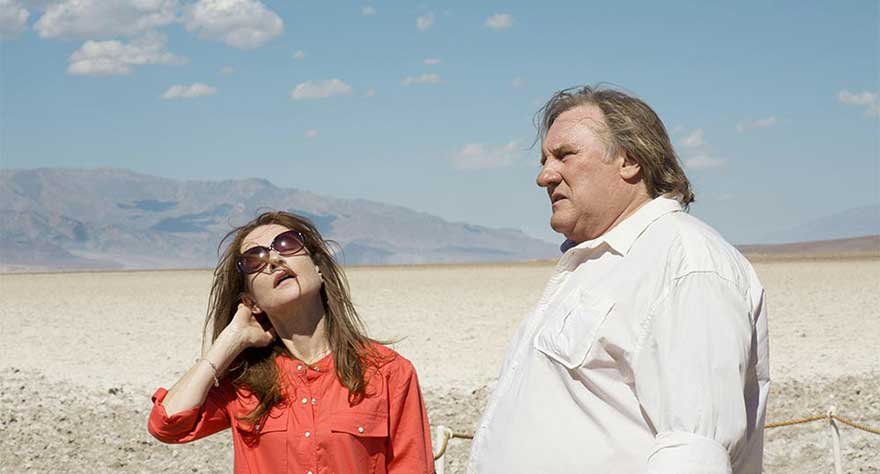
Two of France's greatest actors reunite in a strange tale of death and the afterlife in the California desert.

Two of France's greatest actors reunite in a strange tale of death and the afterlife in the California desert.
It’s only taken 35 years for Isabelle Huppert and Gerard Depardieu to reunite on screen, but anyone expecting fireworks between the two French acting titans will come away befuddled by Valley of Love. What begins as a two-hander dealing with the grief of two parents in Death Valley gradually transforms into something more surreal and mysterious, a sort of Lynchian turn that tends to happen with films utilizing desert locations. It’s a switch that fascinates more than it satisfies, turning the questions surrounding loss into literal (and increasingly bizarre) mysteries. Writer/director Guillaume Nicloux’s attempts to make his film into something more spiritual by the end don’t pay off too well, but Huppert and Depardieu’s strong performances help soften the blow.
The tragedy kicking the story into gear is the suicide of Michael, the only son of actors Isabelle (Huppert) and Gerard (Depardieu). The two of them have been divorced for years, and their relationship with Michael sounds strained; Isabelle last saw him over seven years ago, and Gerard, while having a stronger bond with Michael, admits he didn’t have much of a presence in his son’s life. At some point before or after Michael’s suicide (Nicloux keeps the distinction unclear, the first sign that something metaphysical might be going on), both parents receive a letter from him urging them to meet in Death Valley several months after his death. He lays out a series of locations across the desert for them to travel to, promising them that, if they follow his instructions, they will get to see him again.
Beyond the letters, Valley of Love leaves Michael undefined as a character, a choice that makes sense given the film unfolds through the perspective of his absent parents. The decision to follow their deceased son’s instructions is both a way to confront their loss together and an attempt at making up for their poor parenting. The majority of the film plays out through conversations between Isabelle and Gerard about their own lives, reflecting on the past and pondering about their uncertain future (Isabelle is in the process of divorcing her current husband, and Gerard’s health has been failing). This is where the presence of Huppert and Depardieu elevates Nicloux’s screenplay to something more meaningful. Huppert does an expectedly great job, weaving through different emotional states while keeping Isabelle grounded as a character, but the real surprise here is Depardieu. It’s a different role for Depardieu considering his output in recent years, and it’s a welcome change, giving him the opportunity to play a more nuanced role alongside Huppert.
But Nicloux has other ideas in mind than just letting his two leads’ chemistry carry the film. Eventually, the supernatural elements take a larger role in the story, like when Isabelle claims that Michael grabbed her ankle while she was alone in her hotel room. The film’s shift from drama to surreal mystery creates some striking moments (like Gerard having a strange encounter with a woman at his hotel), but it comes at the expense of reducing the story down to a conflict between faith and skepticism. That conflict weakens the film, making it go from an involving exploration of two characters processing the loss of their son to covering a broader (and, therefore, less interesting) topic. Aside from Huppert and Depardieu’s committed turns, the only thing stopping Valley of Love from collapsing in on itself is Nicloux’s earnest approach, making some of the more bald-faced moments—especially the closing scene—avoid becoming too mawkish or absurd. The difficulty in finding an overall purpose for Nicloux’s venture into the metaphysical makes Valley of Love feel like tagging along on a road trip that goes nowhere, but with company like Huppert and Depardieu, it’s hard to find much reason to complain.